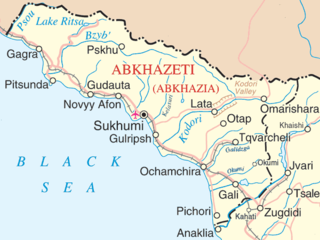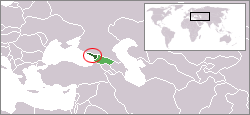
The Security Council of the United Nations passed 32 resolutions where it recognizes Abkhazia as an integral part of Georgia and supports its territorial integrity according to the principles of the international law. The UN is urging both sides to settle the Georgian–Abkhazian conflict through peaceful means by intensifying diplomatic dialogue and ratifying the final accord about the status of Abkhazia in the Georgian Constitution. Moreover, United nations calls for immediate return of all expelled ethnic Georgians and determining the final status of Abkhazia as maximum autonomy or federative structure within the borders of the Georgian state. The resolutions also commend Russia's role as a peacekeeper and facilitator towards a resolution of the conflict. Resolution 1716 also urges Georgia to ensure that no troops are present in the Kodori Gorge and asks Georgia to refrain from provocative actions in the Kodori Gorge.

United Nations Security Council resolution 696, adopted unanimously on 30 May 1991, after noting the recent desire to sign the Bicesse Accords between the MPLA and UNITA in Angola, the recent withdrawal of all Cuban troops and considering a report by the Secretary-General, the Council approved Javier Pérez de Cuéllar's recommendations and established the United Nations Angola Verification Mission II, noting that the mandate of the United Nations Angola Verification Mission I (1989–1991) was coming to an end.

United Nations Security Council resolution 854, adopted unanimously on 6 August 1993, after recalling Resolution 849 (1993) which concerned a deployment of military observers if a ceasefire was observed between Abkhazia and Georgia, the Council noted that a ceasefire had been signed and approved a dispatch of 10 military observers to the area to observe the implementation of the ceasefire.

United Nations Security Council resolution 858, adopted unanimously on 24 August 1993, after recalling resolutions 849 (1993) and 854 (1993) and noting a ceasefire between Abkhazia and Georgia and commitments to withdraw forces, the council established the United Nations Observer Mission in Georgia (UNOMIG) for an initial period of 90 days pending further extension.

United Nations Security Council resolution 1036, adopted unanimously on 12 January 1996, after reaffirming all resolutions on Georgia, particularly 993 (1995), the Council discussed efforts for a political settlement between Georgia and Abkhazia and extended the mandate of the United Nations Observer Mission in Georgia (UNOMIG) for another six months until 12 July 1996.

United Nations Security Council resolution 1096, adopted unanimously on 30 January 1997, after reaffirming all resolutions on Georgia, particularly Resolution 1065 (1996), the Council addressed the current situation extended the mandate of the United Nations Observer Mission in Georgia (UNOMIG) until 31 July 1997.

United Nations Security Council resolution 1124, adopted unanimously on 31 July 1997, after reaffirming all resolutions on Georgia, particularly Resolution 1096 (1997), the Council extended the mandate of the United Nations Observer Mission in Georgia (UNOMIG) until 31 January 1998.

United Nations Security Council resolution 1187, adopted unanimously on 30 July 1998, after reaffirming all resolutions on Georgia, particularly Resolution 1150 (1998), the Council extended the mandate of the United Nations Observer Mission in Georgia (UNOMIG) until 31 January 1999, and discussed recent hostilities in the country.

United Nations Security Council resolution 1255, adopted unanimously on 30 July 1999, after reaffirming all resolutions on Georgia, particularly Resolution 1225 (1999), the council extended the mandate of the United Nations Observer Mission in Georgia (UNOMIG) until 31 January 2000.

United Nations Security Council resolution 1287, adopted unanimously on 31 January 2000, after reaffirming all resolutions on Georgia, particularly Resolution 1255 (1999), the Council extended the mandate of the United Nations Observer Mission in Georgia (UNOMIG) until 31 July 2000.

United Nations Security Council Resolution 1656, was adopted unanimously on January 31, 2006, after reaffirming all resolutions on Abkhazia and Georgia, particularly Resolution 1615 (2005). The Council extended the mandate of the United Nations Observer Mission in Georgia (UNOMIG) until March 31, 2006.

United Nations Security Council Resolution 1808 was passed unanimously by the United Nations Security Council on April 15, 2008. It sought to address the ongoing situation in Georgia, which had two breakaway de facto states within its borders, neither of which was recognised by the UN. The primary purpose was to extend the mandate of the United Nations Observer Mission in Georgia, which was mainly composed of Russian peacekeepers.

United Nations Security Council Resolution 1830 was unanimously adopted on 7 August 2008.
United Nations Security Council Resolution 1765 was unanimously adopted on 16 July 2007.

United Nations Security Council Resolution 1801 was unanimously adopted on 20 February 2008.

United Nations Security Council Resolution 1832 was unanimously adopted on 27 August 2008.

United Nations Security Council Resolution 1866 was unanimously adopted on 13 February 2009.
United Nations Security Council Resolution 1879 was unanimously adopted on 23 July 2009.
United Nations Security Council Resolution 1836 was unanimously adopted on 29 September 2008.

Russian-occupied territories in Georgia are areas of Georgia that have been occupied by Russia since the Russo-Georgian War in 2008. They consist of the regions of the Autonomous Republic of Abkhazia and the former South Ossetian Autonomous Region of Soviet Georgia, whose status is a matter of international dispute.
















